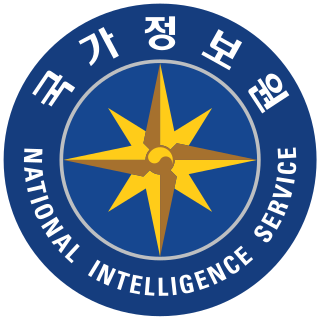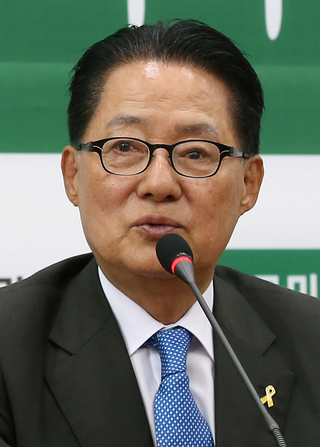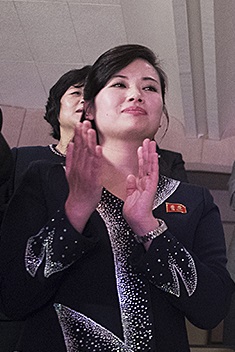
The Watergate scandal was a major political scandal in the United States involving the administration of President Richard Nixon from 1972 to 1974 that led to Nixon's resignation. The scandal stemmed from the Nixon administration's attempts to cover up its involvement in the June 17, 1972, break-in of the Democratic National Committee headquarters in Washington, D.C., at the Watergate Office Building.
Wiretapping, also known as wire tapping or telephone tapping, is the monitoring of telephone and Internet-based conversations by a third party, often by covert means. The wire tap received its name because, historically, the monitoring connection was an actual electrical tap on an analog telephone or telegraph line. Legal wiretapping by a government agency is also called lawful interception. Passive wiretapping monitors or records the traffic, while active wiretapping alters or otherwise affects it.

The Romanian Intelligence Service is Romania's main domestic intelligence service. Its role is to gather information relevant to national security and hand it over to relevant institutions, such as Romanian Government, presidency and law enforcement departments and agencies. The service is gathering intelligence by ways such as signals intelligence (SIGINT), open-source intelligence (OSINT) and human intelligence (HUMINT).

The National Intelligence Service is the chief intelligence agency of South Korea. The agency was officially established in 1961 as the Korean Central Intelligence Agency, during the rule of general Park Chung Hee’s military Supreme Council for National Reconstruction, which displaced the Second Republic of Korea. The original duties of the KCIA were to supervise and coordinate both international and domestic intelligence activities and criminal investigations by all government intelligence agencies, including that of the military. The agency’s broad powers allowed it to actively intervene in politics. Agents undergo years of training and checks before they are officially inducted and receive their first assignments.
Samuel Ong (1945–2009) was a former deputy director of the National Bureau of Investigation (NBI) of the Philippines and is a whistleblower, declaring that the 2004 national elections was rigged, starting an electoral crisis.

The Watergate scandal refers to the burglary and illegal wiretapping of the headquarters of the Democratic National Committee, in the Watergate complex by members of President Richard Nixon's re-election campaign, and the subsequent cover-up of the break-in resulting in Nixon's resignation on August 9, 1974, as well as other abuses of power by the Nixon White House that were discovered during the course of the scandal.

Park Geun-hye is a South Korean politician who served as the 11th president of South Korea from 2013 to 2017, when she was impeached and convicted on related corruption charges.
The Greek wiretapping case of 2004–05, also referred to as Greek Watergate, involved the illegal tapping of more than 100 mobile phones on the Vodafone Greece network belonging mostly to members of the Greek government and top-ranking civil servants. The taps began sometime near the beginning of August 2004 and were removed in March 2005 without discovering the identity of the perpetrators.
The Hello Garci scandal, also known as Gloriagate, was a political scandal and electoral crisis in the Philippines involving 14th president Gloria Macapagal Arroyo, who allegedly rigged the 2004 national election in her favor. The official results of the election gave Arroyo and Noli de Castro the presidency and vice-presidency respectively. Hundreds of national and local positions were also contested during this election. The scandal and crisis began in June 2005 when audio recordings of a phone call conversation between President Arroyo and then-Election Commissioner Virgilio Garcillano, allegedly talking about the rigging of the 2004 national election results, were released to the public. This escalated when the minority of the lower house of Congress attempted to impeach Arroyo. This was blocked by the Arroyo-led majority coalition in September 2005 and no trial took place.
The following is a timeline of the Hello Garci scandal.

Presidential elections were held in South Korea on 19 December 2012. They were the sixth presidential elections since democratization and the establishment of the Sixth Republic, and were held under a first-past-the-post system, in which there was a single round of voting and the candidate receiving the highest number of votes was elected. Under the South Korean constitution, a president is restricted to a single five-year term in office. The term of the then incumbent president Lee Myung-bak ended on 24 February 2013. According to the Korea Times, 30.7 million people voted with turnout at 75.8%. Park Geun-hye of the Saenuri party was elected the first female South Korean president with 51.6% of the vote opposed to 48.0% for her opponent Moon Jae-in. Park's share of the vote was the highest won by any candidate since the beginning of free and fair direct elections in 1987 and the first such election in which any candidate won a majority. Moreover, as of the 2022 election, this is the latest South Korean presidential election in which the winning candidate won an absolute majority of the vote.
The Unified Progressive Party is a banned political party in South Korea. It was founded on 5 December 2011 as a merger of the Democratic Labor Party, the People's Participation Party of Rhyu Si-min, and a faction of the New Progressive Party. Until 12 May 2012 it was jointly chaired by Rhyu Si-min, Lee Jung-hee, and Sim Sang-jung.
The South Korean illegal surveillance incident was alleged to have occurred in 2010 when the Civil Service Ethics Division (공직윤리지원관실) under the Prime Minister's Office of South Korea inspected a civilian, a political action that is illegal under the South Korean conventions. The incident re-emerged in early 2012 as the election approached.

Gorilla scandal is a political corruption scandal in Slovakia. It is named after a Slovak Secret Service wiretap file from the years 2005-2006 which leaked to the internet in December 2011. The file suggests information about politicians, officials and business executives discussing kickbacks in return for procurement and privatization contracts. However the accuracy of the content has not been officially confirmed yet and due to lack of the original tapes it is rather speculation than evidence of true conversations. The file presents alleged massive corruption at the highest level and its leak to the public rocked the Slovak political scene. On October 16, 2019, several Slovak mainstream medias received a link to download a file that appear to be a copy of original wiretapping operation Gorilla.

Park Jie-won is a South Korean politician who served as Director of the National Intelligence Service. He was the chief presidential secretary to President Kim Dae-jung, and served as the Minister of Ministry of Culture, Sports and Tourism and coined the term "Esports" during his administration. On 9 April 2008, he was elected as a member of 18th National Assembly of South Korea for Mokpo as an independent. After being elected, he returned to the Democratic party. In May 2012, he became the floor leader for the Democratic United Party.

Hyon Song-wol is a North Korean singer, band leader, and politician. She is the leader of the Moranbong Band and of the Samjiyon Orchestra. She was formerly a featured vocalist for the Pochonbo Electronic Ensemble in the early 2000s, a pop group which found fame in North Korea in the late 1980s and 1990s. She has been a member in the Central Committee of the Workers' Party of Korea since 2017.

The 2016 South Korean political scandal, often called Park Geun-hye–Choi Soon-sil Gate in South Korea, was a scandal that emerged around October 2016 in relation to the unusual access that Choi Soon-sil, the daughter of shaman-esque cult leader Choi Tae-min, had to President Park Geun-hye of South Korea.
The National Intelligence Service of the Republic of Korea’s illegal eavesdropping case occurred during the Kim Dae-Jung administration when the National Intelligence Service was wiretapping civilians and the opposite political party’s politicians. It was revealed by the Grand National Party lawmaker Chung Hyung-Geun in October 2002, and was considered an election disclosure ahead of the presidential election; however, three years of the investigation confirmed that the allegation of NIS wiretapping was true. In December 2000, during the so-called 'Kwon No-gap's resignation scandal', the phone conversations of young Democratic Party lawmakers and those involved in Jin Seung-Hyun's gate were wiretapped. At the time of Choi Kyu-sun's gate in 2000, it was confirmed that Choi Kyu-sun's business operations, money and women relations, and the details of personnel appointments of high-ranking officials such as the NIS director were also wiretapped.
The 2022 Greek surveillance scandal, sometimes called Predatorgate or Greek Watergate, refers to the prolonged and en masse monitoring of individuals prominent in the Greek political scene, including the president of the social democratic party, PASOK, Nikos Androulakis, the journalists Thanassis Koukakis and Stavros Michaloudis, as well as members of the government and close affiliates of Kyriakos Mitsotakis, among others, via the Greek National Intelligence Service (EYP) or the Predator spyware.







